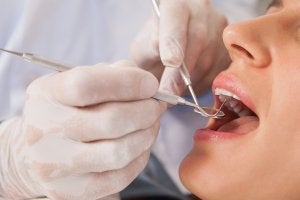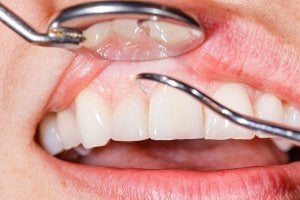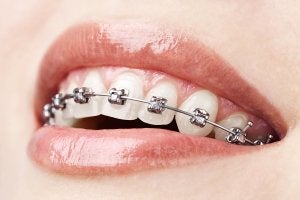-
Get a New Smile Fast with Fastbraces™
 Have you found yourself wishing that you could improve your smile? If so, it’s time to consider seeing an orthodontist near Schaumburg . Many people put off orthodontic treatment thinking that they don’t have time to wear braces or potentially feel self-conscious about their appearance. Now, with Fastbraces™ technology, you can get the smile you’ve always wanted in a fraction of the time it would take with traditional braces. Traditional metal braces are usually worn for at least two years to move the teeth into better positions, but with Fastbraces™, that time is cut down to just one year. Triangular brackets are used to exert gentle yet effective forces on the teeth, moving them faster than traditional square brackets. Fastbraces™ may be suitable for teenagers and adults alike, depending on what the orthodontist recommends. This new technology moves the crown and the root of the tooth at the same time without posing a risk to you and your smile. If you’ve been lamenting the appearance of your crooked teeth, it’s time to see what Fastbraces™ can do for you.
Have you found yourself wishing that you could improve your smile? If so, it’s time to consider seeing an orthodontist near Schaumburg . Many people put off orthodontic treatment thinking that they don’t have time to wear braces or potentially feel self-conscious about their appearance. Now, with Fastbraces™ technology, you can get the smile you’ve always wanted in a fraction of the time it would take with traditional braces. Traditional metal braces are usually worn for at least two years to move the teeth into better positions, but with Fastbraces™, that time is cut down to just one year. Triangular brackets are used to exert gentle yet effective forces on the teeth, moving them faster than traditional square brackets. Fastbraces™ may be suitable for teenagers and adults alike, depending on what the orthodontist recommends. This new technology moves the crown and the root of the tooth at the same time without posing a risk to you and your smile. If you’ve been lamenting the appearance of your crooked teeth, it’s time to see what Fastbraces™ can do for you. -
Happy Patients With Dental Heights
Our family of dentists believes that patients should look forward to their dental office visits. As they understand that each patient is unique, they make it their priority to listen and collaborate with each patient to meet their individual needs. Look at our many great reviews on our Google Plus page! -
Understanding the Importance of Preventative Dental Care
 Everyone wants to have a beautiful, healthy smile that they can show off. With a good at-home oral care routine plus regular visits to an office that offers family dental care in Schaumburg , you’ll be on your way to having a great smile. Some people choose to visit the dentist only when they’re experiencing tooth pain or other issues, rather than on a routine basis. However, preventative dental care is important because it can help detect minor dental issues before they become major problems. Read on to learn more about the importance of preventative dental care.
Everyone wants to have a beautiful, healthy smile that they can show off. With a good at-home oral care routine plus regular visits to an office that offers family dental care in Schaumburg , you’ll be on your way to having a great smile. Some people choose to visit the dentist only when they’re experiencing tooth pain or other issues, rather than on a routine basis. However, preventative dental care is important because it can help detect minor dental issues before they become major problems. Read on to learn more about the importance of preventative dental care. Risk Assessment
When you visit your dentist, you’ll receive a thorough cleaning as well as a comprehensive evaluation of your oral health status. Your dentist will examine your teeth as well as your diet and lifestyle habits to provide you with a picture of whether you’re at risk for cavities. The dentist will also evaluate your risk factors for gum disease , taking into account your current dental health, age, habits, and gum health. As you begin to get a picture of how at risk you are for oral issues, you and your dentist can come up with a plan to help minimize these risks going forward. This might mean changing your diet or adjusting a few of your habits, or it could simply mean committing to regular visits to the dentist’s office.
Early Prevention
There are a number of dental issues that can grow worse over time without treatment, including gum disease, decay, and teeth grinding. During your dental appointment, you’ll receive x-rays and possibly other imaging tests that will reveal any issues that can’t be seen with the naked eye. If your dentist does spot a small cavity, you’ll be able to have it taken care of now instead of waiting for it to get worse. Issues such as cavities that are allowed to progress untreated can become serious, potentially even leading to the need for a procedure such as a root canal. Instead of gambling with your oral health, visit your dentist on a regular basis for preventative care.
-
What Toothpaste Is Right for You?
It can be overwhelming to walk down the toothpaste aisle in a grocery store or pharmacy. With so many choices of toothpaste available, you might not know which one to choose. Brushing your teeth is essential for good dental health and preventing gum disease in Schaumburg . Take a look at this video to learn more about toothpaste and how to determine which one is right for you.
The most important ingredient to look for in a toothpaste is fluoride. Fluoride helps strengthen tooth enamel, protecting you against decay. Toothpastes come in a wide variety of flavors, so chances are you’ll be able to find one that you like whether it has a mint or fruit taste. People with sensitive teeth may want to choose a toothpaste specifically designed for this condition to help block the hot and cold sensations that can lead to discomfort. Your dentist can provide you with a recommendation if you are still unsure of which toothpaste to choose. A good rule of thumb is to look for the seal of approval from the American Dental Association, as products with this seal have undergone rigorous testing to make sure that they do what they claim to do.
-
A Look at Different Types of Orthodontic Issues
 Did you know that straight teeth are more than just aesthetically pleasing? Straight teeth can actually benefit your health, which is just one more reason not to delay visiting your orthodontist in Schaumburg . When your teeth are straighter, it makes it easier to brush and floss, while crooked teeth can make it hard to reach certain areas. Orthodontics can make you feel more confident in the way you look and improve your oral health, so there’s no reason not to explore whether braces might be right for you. Keep reading for a look at different types of orthodontic issues that braces can address.
Did you know that straight teeth are more than just aesthetically pleasing? Straight teeth can actually benefit your health, which is just one more reason not to delay visiting your orthodontist in Schaumburg . When your teeth are straighter, it makes it easier to brush and floss, while crooked teeth can make it hard to reach certain areas. Orthodontics can make you feel more confident in the way you look and improve your oral health, so there’s no reason not to explore whether braces might be right for you. Keep reading for a look at different types of orthodontic issues that braces can address. Crossbite
A crossbite means that your upper teeth rest inside or outside of your lower teeth. This misalignment can make chewing, biting, and speaking difficult, and may also lead to uneven wear on the teeth. Crossbite can also cause the jaw bone to shift to the side as it grows, which can result in painful jaw conditions such as temporomandibular joint disorder. Early orthodontic treatment is best in cases of crossbite.
Underbite
If your lower teeth protrude out further than your front teeth, it’s referred to as an underbite. In extreme cases, surgery may be required to correct the position of the jaw. More often, however, orthodontic treatment can be used to improve an underbite. Braces may be able to help bring the upper teeth forward and move the lower teeth back into a proper position.
Open Bite
When the upper teeth and lower teeth do not meet when you bite down, orthodontists call this an open bite. An open bite can make it difficult to bite off food using the front teeth, and may affect speech, as well. Since the front teeth don’t receive pressure when biting down, it may cause extreme stress on the back teeth. This can cause the back teeth to wear down quickly and lead to other dental problems. If your orthodontist diagnoses you with an open bite, braces may be the right treatment option to help correct this aesthetic and functional issue.
-
Satisfied Dental Heights Patients
From the time you first call our office, you will experience exceptional service, responsiveness, and care. Our team will help to explain and maximize your insurance benefits, offer convenient appointment times, and our dentists will provide the highest level of treatment available today.
We have many happy patients to prove that we are a top notch dental experience from start to finish. You can find some of our great reviews on our Google Plus page!
-
What Are the Cosmetic Benefits of Dental Bonding?
 Dental bonding is a versatile procedure that a dentist near Glendale Heights can use to correct dental imperfections. One of the most common uses of dental bonding is tooth restoration. It can repair teeth damaged by decay and remedy smiles diminished by injuries. So if you have a cavity or chipped tooth, your dentist might use bonding to fix it. A cosmetic dentist might also recommend dental bonding for aesthetic reasons. If you have a tooth that does not match the rest of your smile in shape or color, your dentist can apply the bonding resin over it to achieve a uniform look. He can even use bonding to address minor misalignment issues that cause gapping between teeth. Dental bonding normally requires little tooth preparation and causes no pain, making it an easy way to correct the dental issues getting in the way between you and a beautiful smile.
Dental bonding is a versatile procedure that a dentist near Glendale Heights can use to correct dental imperfections. One of the most common uses of dental bonding is tooth restoration. It can repair teeth damaged by decay and remedy smiles diminished by injuries. So if you have a cavity or chipped tooth, your dentist might use bonding to fix it. A cosmetic dentist might also recommend dental bonding for aesthetic reasons. If you have a tooth that does not match the rest of your smile in shape or color, your dentist can apply the bonding resin over it to achieve a uniform look. He can even use bonding to address minor misalignment issues that cause gapping between teeth. Dental bonding normally requires little tooth preparation and causes no pain, making it an easy way to correct the dental issues getting in the way between you and a beautiful smile. Reference: www.webmd.com
-
What Are the Dangers of Gum Disease?
 Gum disease is a common oral health problem that can cause damage to teeth and gums. As widespread as this condition is, though, consistent oral hygiene can largely prevent you from suffering from it. Your brushing and flossing sessions, as well as regular dental cleanings by a dentist near Schaumburg, can help you enjoy healthy gums for a lifetime and avoid these gum disease complications:
Gum disease is a common oral health problem that can cause damage to teeth and gums. As widespread as this condition is, though, consistent oral hygiene can largely prevent you from suffering from it. Your brushing and flossing sessions, as well as regular dental cleanings by a dentist near Schaumburg, can help you enjoy healthy gums for a lifetime and avoid these gum disease complications: Receding Gums
Plaque buildup is normally the initial cause of gum disease . When bacteria have the chance to feed upon food particles and create acidic byproducts, these substances cling to tooth enamel and harden onto it. In response, the gums may become inflamed, and this inflammation eventually causes them to recede from the gumline. As gum tissue continues to pull back from tooth enamel, it leaves teeth vulnerable to additional plaque accumulation that can foster infection and tooth decay.
Tooth Loss
Without professional gum disease treatment from a dentist, receding gums can evolve into missing teeth. As gum tissue becomes weaker and less able to fortify teeth, you might notice your teeth beginning to shift in your mouth. In some cases, they may even fall out, or your dentist may need to extract them. Once tooth loss occurs, restoration of your smile would likely require dental implants or dentures.
Cardiovascular Disease
Heart disease is one of the most pressing health issues in the United States, and many healthcare providers see a connection between this problem and gum disease. When gum disease is severe, the bacteria causing it can eventually enter the affected gums and the blood vessels supplying nutrients to them. Once in the bloodstream, these bacteria can continue to trigger tissue inflammation. This side effect of gum disease could potentially increase your risk of a future heart attack, heart failure, or stroke. However, making sure that you regularly go to your dental office can safeguard you from these life-threatening issues. During your dental cleanings, your dentist can remove plaque that may be causing gum inflammation and recession to help you keep your smile free from gum disease.
Reference: www.prevention.com
-
What Happens After a Root Canal?
Root canal therapy alleviates not only tooth pain but also tissue infection. This video explains why seeing a dentist near Schaumburg for an infected tooth is so important.
When a tooth has an infection, it cannot expand to accommodate the growing bacteria inside it, which is why sufferers feel pain. The longer this infection persists, the more damage it can do to the tooth and bone surrounding it. A dentist performs a root canal to remove the infection and the potentially destructive pressure that it creates. As a result, after root canal therapy, patients often feel little to no pain when leaving the dental office. Their discomfort is gone, but equally important, their teeth are no longer vulnerable to the damaging effects of an infection.
-
A Patient’s Guide to Braces
 Getting braces in Schaumburg now can help you have a more cosmetically pleasing smile in the future. Plus, because of treatment advances, undergoing orthodontic work is easier than ever. When you keep in mind these guidelines, you can better ensure that your teeth and gums remain healthy and strong while you wear your braces.
Getting braces in Schaumburg now can help you have a more cosmetically pleasing smile in the future. Plus, because of treatment advances, undergoing orthodontic work is easier than ever. When you keep in mind these guidelines, you can better ensure that your teeth and gums remain healthy and strong while you wear your braces. Cleaning Your Teeth
Daily brushing and flossing are integral to avoiding tooth decay and gum disease. When you get braces, your dentist may advise that you make a few oral hygiene changes to protect your dental health. For one, you may need to replace your toothbrush more often. Contact between your braces and toothbrush can quickly wear out its bristles, making them less effective at scrubbing away bacteria and food particles. Two, you might have to allow yourself more time to clean your teeth and gums. Threading your floss through your wire can require a few extra minutes, as well as brushing thoroughly around each brace bracket.
Eating Meals
Wearing braces doesn’t mean that you have to overhaul your normal diet. Because food can easily catch on your brace brackets and wire, though, you may need to make a few minor alterations to your eating habits. For instance, when you eat fibrous foods, slice them into portions that you can eat with your back teeth instead of biting into them with your front teeth. You may also want to avoid sticky foods that can cling to your orthodontic equipment.
Seeing Your Dentist
Keeping up with your dental exams is crucial while you undergo orthodontic treatment. Even when you regularly brush and floss your teeth, bacteria and plaque can easily grow around your brace brackets. As a result, your teeth may be more vulnerable to tooth decay and gum disease while you undergo treatment. When you get dental cleanings, your dentist can thoroughly remove any accumulated plaque and tartar on your tooth enamel that may cause oral disease. He can also evaluate your orthodontic equipment to ensure that it is functioning as needed to move your teeth into better alignment as quickly as possible.
Reference: www.knowyourteeth.com
RECENT POSTS
categories
Archives
2017
2016
2015
- October (1)
- September (2)
- August (4)
- July (4)
- June (5)
- May (4)
- April (4)
- March (5)
- February (5)
- January (5)
